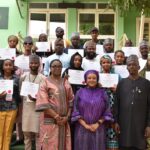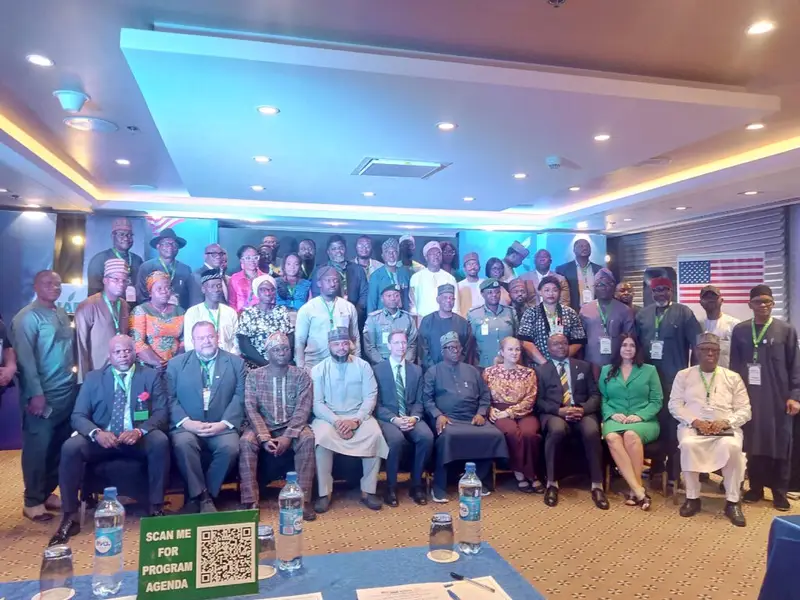By Felicia Imohimi
The U.S. Mission’s Foreign Agricultural Service (FAS) has partnered with the Federal Government to adopt innovative solutions aimed at enhancing agricultural trade for economic growth and food security.
Mr Matthew Obogbaimhe, Chairman of the Nigerian-American Chamber of Commerce (NACC), Kaduna Chapter, said this at a roundtable on Thursday in Abuja.
Obogbaimhe said revitalising Nigeria’s agricultural sector required more than trade restrictions, stressing that the sector demands innovation, sustainable practices and investment in infrastructure.
The News Agency of Nigeria (NAN) reports that the roundtable, tagged “Innovative Approaches to Agricultural Trade for Economic Growth and Food Security,” was organised by FAS in collaboration with NACC and the Nigeria Agribusiness Group (NABG).
The discussion focused on the impacts of Nigeria’s agricultural trade restrictions on food prices, local production and investment.
It also provided the U.S. Mission’s FAS with an opportunity to connect with policy advisers and push for reconsideration of restrictions on U.S. agricultural exports.
Obogbaimhe said the partnership with FAS was driven by a vision to promote agricultural innovation and trade across Africa.
“The roundtable provided a unique platform to exchange ideas and explore innovative agricultural trade policies that benefit consumers and farmers in Nigeria and the United States,” he said.
Mr Christopher Bielecki, Agricultural Counselor for the FAS office in Lagos, said the forum enabled stakeholders to discuss innovative solutions to strengthen agricultural trade, reduce costs for agribusinesses and consumers, and create prosperity for American and Nigerian farmers.
“The U.S. Mission’s FAS office looks forward to continued collaboration with the Nigerian government and agribusiness stakeholders to translate the roundtable’s recommendations into action.
“By working together to advance innovative agricultural trade policies, the United States and Nigeria can foster greater food security, create opportunities for value-added processing, attract investment and strengthen the agricultural sector,” Bielecki said.
NABG Director-General, Mr Jafar Umar, described the roundtable as timely and highly relevant to the national discourse on trade and food security.
He expressed the group’s readiness to partner with FAS, noting that NABG remains the leading voice of agribusiness in Nigeria.
Also speaking, Dr Betty Adegebo, a member of the National Institute for Policy and Strategic Studies (NIPSS) research team, said Nigeria’s agricultural trade restrictions had resulted in higher food prices, increased informal trade, and inefficiencies in production, while failing to achieve self-sufficiency.
Presenting NIPSS findings, Adegebo said food inflation surged to 30.6 per cent in 2023, with staples such as rice and beef more than doubling in price over two years.
She noted that the price of one kilogramme of local rice rose by 137.32 per cent year-on-year in October 2024, while boneless beef increased by 98.73 per cent.
“Production challenges persist, including an estimated maize production gap of 300,000 metric tonnes annually, and low yields of 2.0 tonnes per hectare, far below South Africa’s 5.2,” Adegebo said.
She added that informal trade had expanded, especially in rice and poultry, as high tariffs and import bans continued to encourage cross-border smuggling despite government measures such as the 2019 border closure.
Adegebo said NIPSS recommended reducing import bans and tariffs, adopting long-term predictable trade policies, harmonising tariffs and sanitary and phytosanitary regulations, and leveraging frameworks such as the African Continental Free Trade Area (AfCFTA).
She also called for the establishment of a centralised body to oversee agricultural trade regulations, improve official trade, strengthen sanitary and phytosanitary oversight, and boost government revenue.
The News Agency of Nigeria (NAN) reports that the event was attended by Nigerian agricultural trade policy advisors, legislative representatives, agribusiness leaders, researchers, regulators, and U.S. agricultural trad associations. (NAN)
Edited by Tosin Kolade












